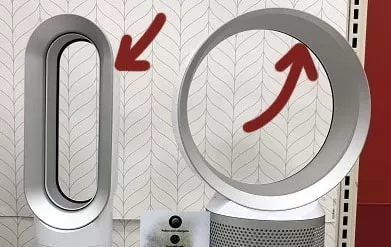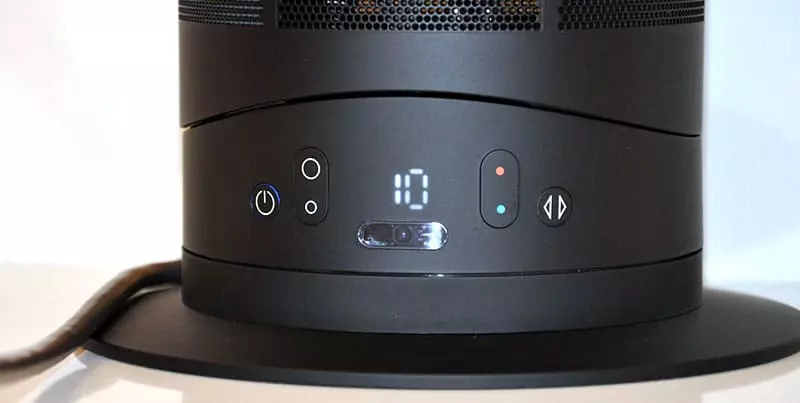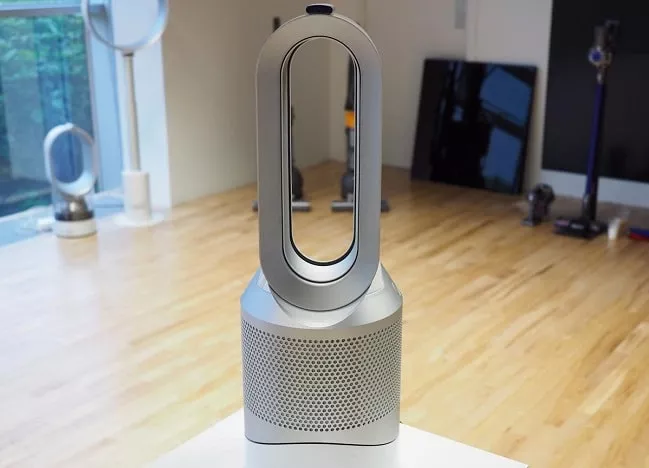How long can a Dyson heater run without interruption? Is it safe to run a Dyson heater overnight?
In this article, we’re going to inspect everything we need to find out how long a Dyson heater can truly safely operate.
We’re going to check
- the design of a Dyson heater and where the heat accumulates
- how hot Dyson heaters get
- how much power Dyson heaters draw and whether that can overload circuits
- whether Dyson heaters can melt
And in the end, we’re going to conclude with what you can do to prepare your Dyson for long heating sessions!
Quick answer: You can run a Dyson heater 24/7 in insulated living spaces such as your bedroom, living room, or kitchen. Dyson heaters don’t accumulate heat and, therefore, don’t overheat when you run them for a long time. And additionally, they have built-in overheat protection. Also, the air coming out of a Dyson heater is not hot enough to ignite any common household materials. You shouldn’t run a Dyson heater in an uninsulated space such as a garage or RV since then it will run on full power which could overheat the electric circuit.
Will Dyson heaters overheat during long heating sessions?
In general, Dyson heaters, such as this Dyson Hot + Cool (click here to view it on amazon), do not overheat during long heating sessions. Here’s why.
How a Dyson heater’s design increases safe running time
A Dyson heater contains two heating elements. One sits on either side of the heater and is responsible for heating the air coming out of its respective side of the loop amplifier.
To carry the heat out of the loop amplifier the fan sitting inside the heater’s case constantly has to blow air over the heating elements.
 The “loop amplifier” is the big circular air vent on top of a Dyson heater
The “loop amplifier” is the big circular air vent on top of a Dyson heater
This ensures that the heating elements do not overheat. It’s like a constant cooling breeze is drawing over the heating elements.
It could, however, be that a Dyson heater’s heating elements overheat on very low fan settings.
In this case, the airflow to carry the heat away from the heating elements is too weak.
I assume that Dyson implemented a safety mechanism to reduce the heating on very low fan settings. So, that’s something you don’t need to worry about too much.
How hot do Dyson heaters get?
You can set a Dyson heater’s thermostat to a maximum temperature of 99°F or 37°C.
This is, however, not necessarily the temperature of the air coming out of the bladeless fan.
The temperature you set on the thermostat is the target temperature you want your room to be.
To reach this temperature, your Dyson heater has to output air that’s hotter than the target temperature. Otherwise, it would be physically impossible to reach the target temperature (unless your room is an ideally insulated space, which it isn’t).
So, the target temperature you set is the minimum temperature of the air leaving it.
But how hot is it?
Electric heating elements usually get up to 750°F to 850°F (around 400°C to 450°C) hot. This means the temperature of the air leaving the Dyson heater must be between 99°F and 850°F (between 37°C and 450°C).
Since the air distributes within the Dyson heater’s loop amplifier (which is usually a comparably large space) and knowing that Dyson heaters do not get hot to the touch, I’d estimate the temperature to be around 140°F (60°C).
So, to summarize:
The heating elements inside a Dyson heater get up to 850°F (450°C) on full power. But the internal fan distributes the heat quickly so that the air leaving a Dyson heater is usually below 140°F (60°C).
Can a Dyson heater ignite anything?
Can anything ignite from a Dyson heater when running it for a long time?
Well, the air leaving a Dyson heater, even if you run it for many hours, does not get hotter. It’s always going to be below 140°F.
That’s not enough to ignite anything… Or is it?
Here’s a table of materials with low ignition temperatures. I’ve only included materials with an ignition temperature below 200°F (93°C):
| Material | Ignition Temperature (in °F) |
|---|---|
| Triethylborane | -4°F |
| Silane | 70°F |
| Phosphorous - White | 93°F |
| Phosphorous - Transparent | 120°F |
Triethylborane (whatever that is, I am not a chemist) ignites below room temperature. So, that’s nothing you have to worry about.
Silanes are compounds of silicon. If you don’t know what that is, you probably don’t have it at home (standing before your Dyson heater) anyways.
And the same is true for Phosphorus.
To conclude:
A Dyson heater does not get hot enough to burn any common materials (such as wood, plastic, or metal). So, Dyson heaters can’t cause ignition of any materials standing in front of them, even if the heater runs for a long time.
At what temperature does a Dyson case melt?
Dyson heater cases are made of ABS (Acrylonitrile butadiene styrene), which can withstand temperatures up to 80°C (176°F).
That’s the temperature at which the ABS material would lose its most important characteristics, including its such as high impact resistance.
ABS is “amorphous”, meaning the atoms don’t sit in a fixed structure (such as in crystals) it has no true chemical melting point. Instead, it melts slowly with increasing temperature.
However, ABS will definitely melt at 230°C (446°F).
So, can the ABS material of a Dyson case melt?
No, because the heating elements don’t touch the case directly. Instead, the heating elements have plenty of air surrounding them. And additionally, the fan carries away the heat.
A Dyson heater won’t melt over long running periods.
What stops a Dyson heater from overheating?
It’s not only the design, the material, and the built-in fan that makes a Dyson heater so safe.
Dyson heaters also have the following safety features:
Tip-over protection
The tip-over protection automatically shuts off the heating when the Dyson heater tips over.
So, it’s impossible that, for example, a pet tips over the heater and causes a fire while you sleep.
The tip-over protection also shuts the heater off automatically when it’s tilted. So, it doesn’t even have to fall over completely.
Overheat protection
The overheat protection in a Dyson heater automatically shuts off the heating when the heater overheats.
That’s great, because, as we’ve seen earlier, the heating elements can theoretically get hot enough to melt the case.
The overheat protection prevents that.
Thermostat
The built-in thermostat constantly monitors the temperature and controls the heat output.
The thermostat ensures that your Dyson heater never overheats your room, or any objects in your room, such as the carpet or curtains.

Can a Dyson heater overheat your home’s electric circuit?
Dyson heaters can draw up to 2,000W of power. That’s a lot!
Regular space heaters only draw up to 1,500W. For a reason. Here’s why:
Electric grids in the US and in Europe can handle different amounts of power. US-based electric circuits are a lot more sensitive.
The reason is that US home circuits are low voltage. They use 120V and 15A circuits, which limits the power usage to 120V × 15A = 1,800W.
Now, some US homes can handle up to 20A of current which would allow for a power consumption of 120V × 20A = 2,400W.
So, the former 15A circuit, can’t handle a Dyson heater’s peak power at 2,000W.
In Europe and in the UK, all circuits can handle any heater, as they use 230V, and can, therefore, support twice the power (up to 4,800W).
So, the answer is:
Yes, a Dyson heater can theoretically overheat a US home’s electric circuit. However, Dyson heaters only draw the full peak power of 2,000W in very cold rooms, such as uninsulated cabins or garages.
Also, your circuit breaker will trip or a fuse will blow before anything overheats.
Dyson heaters are always safe to use in insulated spaces where they don’t have to run on maximum power.
How long can you run a Dyson heater?
Let’s recap everything we’ve learned:
- Dyson heaters are designed in a way that heat is quickly carried out of the case
- The air coming out of a Dyson heater is hot, but not hot enough to ignite anything
- The case of a Dyson heater will never melt unless the fan breaks and the overheat protection fail at the same time
- Dyson heaters won’t overheat your home’s electric circuit unless you run it in a very cold and uninsulated space (which would cause the heater to run at maximum power)
Based on these findings, we can conclude:
You can run a Dyson heater 24/7 in your living space. The safety mechanisms of Dyson heaters prevent damage from long running durations. Also, Dyson heaters don’t trap heat, which makes heat accumulation impossible.
Because of the built-in thermostat and overheat protection a Dyson heater is able to figure out on its own when to stop heating.
You don’t have to worry about it.
Can you leave your Dyson heater on all night?
Yes, you can leave your Dyson heater on all night. A Dyson heater won’t overheat unless you block the amplifier loop (where the hot air leaves) with curtains or your blanket. So, place it at a safe distance.
You can even place a Dyson heater on the carpet in your bedroom. Carpets never ignite at the low temperatures coming out of a Dyson heater. And additionally, Dyson heaters vent their heat at the top, so they carry heat away from the carpet.
How to increase Dyson heater running durations
If you are still worried about running your Dyson heater for long periods, or overnight, then here are some more tips for you.
Here’s how to improve the safety of your Dyson heater during long running sessions:
Use higher fan settings
The built-in fan blows air over the heating elements. Accordingly, the higher the fan settings are, the lower the heating elements’ temperature is.
This reduces the risk of overheating and also reduces the temperature of your heating elements when they run for a long time.
Don’t use a Dyson heater in cold and uninsulated spaces
Dyson heaters are not safe to use in very cold spaces such as uninsulated garages or RVs during wintertime.
The reason is that the cold temperature in combination with the lack of insulation causes the heater to run on peak power consumption continuously.
On 15A circuits in the US, this is a problem and can cause fuses to blow or circuit breakers to trip.
Or even worse, if there is no proper safety mechanism, then the circuit will overheat.
Instead, use your Dyson heater only in well-insulated living spaces, such as your bedroom or your living room.
Set moderate temperatures
Set only moderate heating settings. This directly affects the temperature of your heater’s heating elements as well as the Dyson heater’s power consumption.
By lowering the power consumption, you reduce the risk of overheating your electric circuit. And you reduce the temperature of the air leaving the Dyson heater.
So, it’s even safer to run 24/7.
